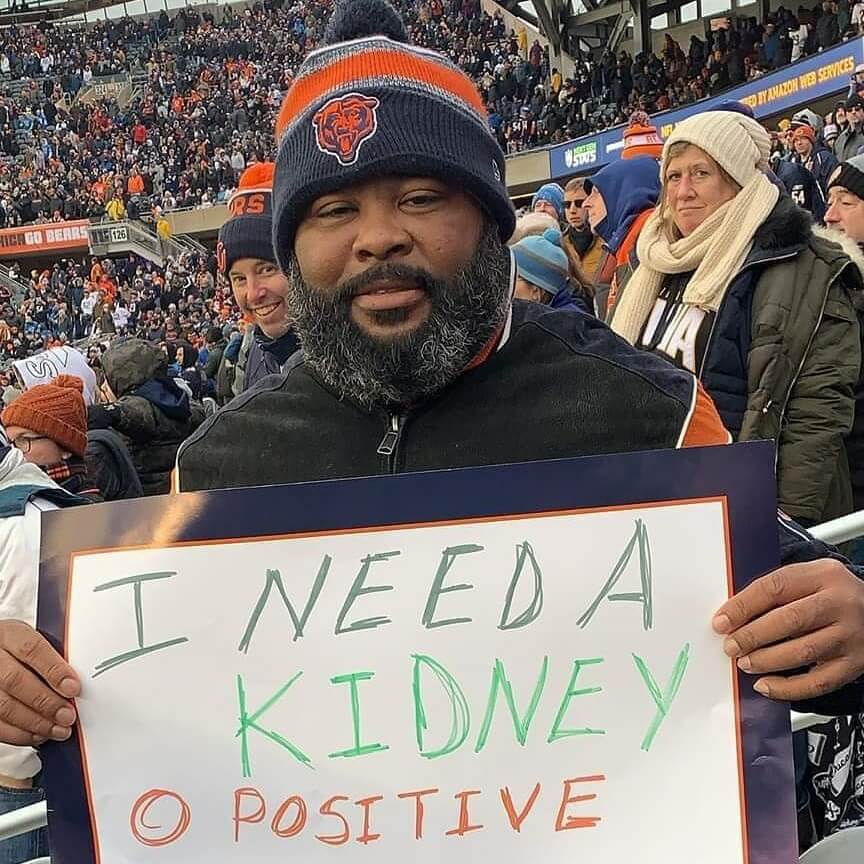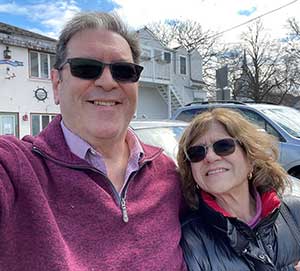Paired Kidney Exchange: Giving & Receiving the Gift of Life

When Marcia Sacovitch found out that her husband Bill needed a kidney transplant, her first thought was, "Well heck, if I'm a match, he can have my spare!"
She knew that as a living donor, she could provide a life-saving treatment for her husband. Unfortunately, they weren’t a match—but that didn’t mean she couldn’t help him get a transplant. Even though Marcia couldn’t donate directly to Bill, she was a great match for someone else. Thanks to a paired kidney exchange program, Marcia's gift of life will help another person in a similar situation. In turn, Bill will get his transplant sooner.
She knew that as a living donor, she could provide a life-saving treatment for her husband. Unfortunately, they weren’t a match—but that didn’t mean she couldn’t help him get a transplant. Even though Marcia couldn’t donate directly to Bill, she was a great match for someone else. Thanks to a paired kidney exchange program, Marcia's gift of life will help another person in a similar situation. In turn, Bill will get his transplant sooner.
Two of a Kind
Bill has lived with polycystic kidney disease for years, but recently his symptoms worsened. It was time for either dialysis or a transplant. Transplant is considered the most effective treatment for kidney failure and well-matched kidneys from living donors have higher success rates than those from deceased donors. For these reasons, Bill and Marcia reached out to the National Kidney Registry to learn about living donation and get Bill added to the transplant list.
Marcia works at a Fresenius Kidney Care dialysis center in Florida, so she is familiar with kidney disease and has seen how life-changing transplant can be. She was disappointed she couldn’t donate to Bill, but by a stroke of luck, they discovered the paired kidney exchange program. "It’s kind of funny how we learned about it," Marcia says. "One of our medical directors here at the dialysis center hosted a Christmas party where we ran across a couple who participated in a kidney swap."
A paired kidney exchange program, also called a kidney swap program, matches a living donor and their intended recipient with people in the same situation. This may be an exchange with another pair or part of a chain to help even more people get transplants sooner. In Marcia and Bill's case, Marcia is donating her kidney to a stranger in Atlanta, and a well-matched living donor will be giving their kidney to Bill.
This program helps people in need of kidneys receive compatible organs more quickly. On average, the wait time on the transplant list is three to five years. With a paired kidney exchange, this wait time can be shortened to as little as 30 to 90 days.
Marcia works at a Fresenius Kidney Care dialysis center in Florida, so she is familiar with kidney disease and has seen how life-changing transplant can be. She was disappointed she couldn’t donate to Bill, but by a stroke of luck, they discovered the paired kidney exchange program. "It’s kind of funny how we learned about it," Marcia says. "One of our medical directors here at the dialysis center hosted a Christmas party where we ran across a couple who participated in a kidney swap."
A paired kidney exchange program, also called a kidney swap program, matches a living donor and their intended recipient with people in the same situation. This may be an exchange with another pair or part of a chain to help even more people get transplants sooner. In Marcia and Bill's case, Marcia is donating her kidney to a stranger in Atlanta, and a well-matched living donor will be giving their kidney to Bill.
This program helps people in need of kidneys receive compatible organs more quickly. On average, the wait time on the transplant list is three to five years. With a paired kidney exchange, this wait time can be shortened to as little as 30 to 90 days.
Getting Ready for a Gift
Marcia and Bill are preparing for donation and transplant by staying healthy and active while checking in with their doctors regularly. Bill is managing his kidney disease and had a fistula placed just in case he needs dialysis after transplant surgery.
Marcia emphasizes that people waiting for a kidney need to maintain their health as best they can. "Lots of people fall behind on their treatments or shorten their dialysis sessions," she says. "But don’t do those things. If you’re managing your diabetes, blood pressure, and phosphorus, you’ll be more likely to get a transplant sooner. Your doctors want you to be successful."
Before joining Fresenius Kidney Care as a certified clinical hemodialysis technician (CCHT), Marcia worked as a paramedic. Bill’s experience with kidney disease inspired her to start working with people on dialysis. She enjoys taking the time to get to know people at the center. "It’s a family,” she says. “I love the people and I’ve learned so much. It’s helped me prepare for my own kidney journey."
Marcia also appreciates the paid donor leave program through Fresenius Medical Care. This program provides six weeks of benefits for organ donors. "That's a big burden lifted off my shoulders, especially since I need some time off to be with my husband when he has his surgery," she says. And thanks to the paired kidney exchange program, her appointments, tests, and donation surgery won't cost her anything.
"I can't tell you how many people have offered to help," Marcia says gratefully. Friends, family, and coworkers have stepped up to cheer her on and offer support however they can. "The outpouring of love is amazing,” she says. “This is what it's about. This is what makes the decision to donate so easy for me."
Marcia emphasizes that people waiting for a kidney need to maintain their health as best they can. "Lots of people fall behind on their treatments or shorten their dialysis sessions," she says. "But don’t do those things. If you’re managing your diabetes, blood pressure, and phosphorus, you’ll be more likely to get a transplant sooner. Your doctors want you to be successful."
Before joining Fresenius Kidney Care as a certified clinical hemodialysis technician (CCHT), Marcia worked as a paramedic. Bill’s experience with kidney disease inspired her to start working with people on dialysis. She enjoys taking the time to get to know people at the center. "It’s a family,” she says. “I love the people and I’ve learned so much. It’s helped me prepare for my own kidney journey."
Marcia also appreciates the paid donor leave program through Fresenius Medical Care. This program provides six weeks of benefits for organ donors. "That's a big burden lifted off my shoulders, especially since I need some time off to be with my husband when he has his surgery," she says. And thanks to the paired kidney exchange program, her appointments, tests, and donation surgery won't cost her anything.
"I can't tell you how many people have offered to help," Marcia says gratefully. Friends, family, and coworkers have stepped up to cheer her on and offer support however they can. "The outpouring of love is amazing,” she says. “This is what it's about. This is what makes the decision to donate so easy for me."
The Road Ahead
Marcia and Bill are excited to take this next step on their journey and continue helping others. "When we’re not dealing with everything kidney, we like to ride around the country in our Corvette," Marcia says. They are active members of a car club that helps raise funds for local emergency services and disaster relief organizations. Marcia and Bill are looking forward to enjoying more time on the open road together.
After Marcia’s donation, her remaining kidney will continue to support her. Most medically eligible people can continue to live normal, healthy lives after donating a kidney.
Marcia wholeheartedly encourages others to "share their spare" with a loved one either directly or through a kidney swap. For her, the opportunity to change a life is deeply rewarding and very personal. "My live donor group encourages us to name our kidney, and I’ve named mine Wheezie," she laughs. "Wheezie is going to Atlanta and I never imagined this, but I’m thrilled to do it. I’m so happy I’m going to save someone’s life."
After Marcia’s donation, her remaining kidney will continue to support her. Most medically eligible people can continue to live normal, healthy lives after donating a kidney.
Marcia wholeheartedly encourages others to "share their spare" with a loved one either directly or through a kidney swap. For her, the opportunity to change a life is deeply rewarding and very personal. "My live donor group encourages us to name our kidney, and I’ve named mine Wheezie," she laughs. "Wheezie is going to Atlanta and I never imagined this, but I’m thrilled to do it. I’m so happy I’m going to save someone’s life."
Suggested topics

From Sudden Kidney Failure to a Transplant from a Neighbor
A sign, a need, and random acts of kindness aligned so that Marcus Edwards, a proud father of four, received a new kidney after two years of waiting.
In 2019, Marcus went in for a routine doctor’s appointment for his diabetes and was surprised to be sent to the emergency room (ER) when his nurse noticed...
Read MoreIn 2019, Marcus went in for a routine doctor’s appointment for his diabetes and was surprised to be sent to the emergency room (ER) when his nurse noticed...
What You Should Know as You Prepare for a Kidney Transplant
Right now, tens of thousands of people with kidney disease are considering or planning for a kidney transplant. If this is an option you’re starting to explore, you probably have lots...

From Kidney Cancer to Kidney Transplant: A Patient Journey
A diagnosis of COVID-19 can be frightening, but so can one of cancer. Dario Volante, a 58-year-old retired optician, unfortunately experienced...
Read More